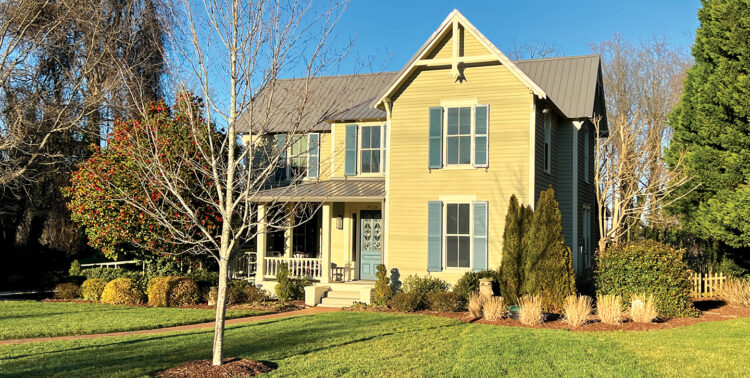
Sherrill-Robbins House on Zion / Photo by Jason Benavides
March 10. By Dave Vieser. As downtown redevelopment kicks in—and more historic properties are threatened—the town’s Historic Preservation Committee seems poised for change. New members were appointed at a February Town Board meeting and 2022 goals were reviewed by commissioners, including the need for naming more historic designations in Cornelius.
2022 goals
The committee announced five new goals at the recent Town Board Meeting:
1. Refresh and evaluate information on the town Preservation Plan and Inventory Survey.
2. Educate the community on historic preservation and designations.
3. Research properties and history not currently on a plan or survey for potential inclusion.
4. Coordinate with the County Landmarks Commission and property owners for 2-4 designations annually.
5. Organize events through partnerships.
New blood
Four new members were also appointed to the Historic Preservation Committee: Donald Gest, Mary Phalen, Brigette Tinsley, and Paula Wolfe. The town board also reappointed Jessica Boye, Kathryn McClelland, Julie Miller, Joe Purdy, and Kyle Scharf with Boye as chair of the committee. All recommendations were approved unanimously by the commissioners.
At the same meeting, Mayor Woody Washam took the opportunity to repeat his desire to some day develop a history museum for Cornelius. “Our town has a beautiful history which we need to preserve,” Washam said. It’s been discussed for years; plans to include a museum in the Cain Center for the Arts fell through.
Committee vs. commission
The town initially had a Historic Preservation Commission but it was disbanded in 2014 and replaced with a Historic Preservation Committee. According to the minutes of the July 7, 2014 meeting, there were several reasons for the switch from a more powerful commission to a committee:
• To support a new partnership with Mecklenburg County which would recommend properties for local landmark designation;
• Continue to preserve the historic heritage of the community;
• Educate the community on the history of Cornelius and historic preservation;
• Form new partnerships with other agencies/companies to enhance historic preservation and raise awareness of the program in the community;
• Encourage the use of historic preservation as an economic tool.

Herron
At the time of the change, Deputy Town Manager Wayne Herron said Cornelius was the only municipality in Mecklenburg County with a historic commission.
All other municipalities partnered with the Charlotte-Mecklenburg Historic Landmarks Commission to prepare required reports and conduct state-mandated hearings for local landmark designation, Herron said.
“We felt that partnering with entities such as private consultants, North Carolina Historic Preservation Office, Preservation North Carolina and/or the Charlotte-Mecklenburg Historic Landmarks Commission (CMHLC) would likely result in more designations simply due to the depth of knowledge and expertise of the designation process within these organizations,” he said.
Recent designations
• In 2018, a restored 113-year-old Queen Anne style house on Zion Avenue owned by real estate attorney Susan Irvin.
• In 2020, the Cornelius Elementary Agriculture Building “is a sophisticated example of a Classical Revival style institutional structure.
• Potts Barber Shop on Catawba Avenue—one of the oldest businesses in Cornelius—was officially recognized during the town’s Black History Month observance in February.
The committee has 12 meetings calendared per year. However, when no business is on the agenda, meetings can be canceled. For example, six of 12 meetings in 2021 were cancelled, apparently due to a lack of agenda items and/or the pandemic.
There are some who feel more could be done to preserve the town’s rich heritage. Abigail Jennings was the first chair for the Cornelius Historic Landmark Commission, before it was dissolved and the governance was given back to Mecklenburg County in 2014.
“Historic preservation has generally been an afterthought vs. a priority when it comes to development in our region,” Jennings said.

Jennings
Indeed, once the community has knowledge that a historic site will be lost to a new development it is generally too late to preserve, as plans may have been in the works years before going public.
“New, big, and shiny is often the choice vs. restoration, rehabilitation, and reuse for special historic places,” said Jennings. “The claim that properties are too far gone and not worth saving is often not the case but rarely is the issue pushed or creative solutions sought.”
Jennings said tax credits and incentives can help support historic preservation and adaptive reuse.
“I truly believe the end result of a restored historic place is one that has many rewards for the property owner and the community alike.”
One of the committee’s 2022 is designating between two and four locations annually for landmark status.
All that said, a historic designation is just that—a designation. If the property owner decides to sell or redevelop a historic building, the landmark designation protects it for one year through a demolition moratorium. Plans that involve destroying a historic structure can only be delayed, not denied, according to the Landmarks Commission bylaws.




